新疆的若干歷史問題(雙語全文)
新華網 2019-07-22 09:19

七、伊斯蘭教不是維吾爾族天生信仰且唯一信仰的宗教
VII. Islam Is Neither an Indigenous nor the Sole Belief System of the Uygurs
維吾爾族先民最初信仰原始宗教和薩滿教,后來相繼信仰過祆教、佛教、摩尼教、景教、伊斯蘭教等。唐宋時期,在高昌回鶻王國和于闐王國,上至王公貴族、下至底層民眾普遍信仰佛教。元代,有大量回鶻人改信景教。直到今天,仍有一些維吾爾族群眾信奉其他宗教,也有許多人不信仰宗教。
Primitive religion and Shamanism were practiced by the ancestors of the Uygurs before Zoroastrianism, Buddhism, Manichaeism, Nestorianism and Islam were introduced into the region. During the period spanning the Tang and Song dynasties, Buddhism was the predominant religion practiced by the nobility and the common people in the Uighur Kingdom of Gaochang and the Kingdom of Khotan. Many Uighurs converted to Nestorianism during the Yuan Dynasty. Today in Xinjiang, a significant number of people do not follow any religion, and many Uygurs follow religions other than Islam.
伊斯蘭教傳入新疆地區,與阿拉伯帝國興起和伊斯蘭教由西向東擴張有關。維吾爾族信仰伊斯蘭教,不是當時民眾主動改信和轉型,而是宗教戰爭和統治階級強制推行的結果。雖然這種強迫并不影響今天尊重維吾爾族群眾信仰伊斯蘭教的權利,但它是一個歷史事實。伊斯蘭教既不是維吾爾族天生信仰的宗教,也不是唯一信仰的宗教。
The introduction of Islam into Xinjiang was related to the emergence of the Arab Empire and the eastward expansion of Islam. The Uighur conversion to Islam was not a voluntary choice made by the common people, but a result of religious wars and imposition by the ruling class, though this fact does not undermine our respect for the Muslims’ right to their beliefs. Islam is neither an indigenous nor the sole belief system of the Uygur people.
新疆的維吾爾、哈薩克等民族的先民在接受伊斯蘭教過程中,既保留了這些民族原有的信仰和文化傳統,又吸收了新疆地區其他民族和內地的文化,一些原有的宗教觀念、儀式、風俗習慣經演化得以存續,并相互影響,逐漸形成了具有鮮明地域特征和民族特色的新疆伊斯蘭教。例如,伊斯蘭教原本反對崇拜安拉之外的任何人或物,但維吾爾等民族至今仍有麻扎崇拜,這是伊斯蘭教本土化最典型的表現。在麻扎上立高桿、掛旗幡、懸羊皮等習俗,則是薩滿教、佛教等多元宗教的遺存。又如,始建于乾隆年間的伊寧拜圖拉清真寺、烏魯木齊陜西大寺等,在修建時采用了內地傳統梁柱式結構。這都是伊斯蘭教中國化的具體表現。
In the process of accepting Islam, the ancestors of the Uygurs and Kazaks integrated it with local faiths and traditions, while absorbing the cultures of other ethnic groups in the region and from inland areas. Some of their religious concepts, rituals and customs remained as they evolved. Through interaction with these elements, Islam in Xinjiang gradually developed distinct local and ethnic features. For example, orthodox Islam does not allow the worship of anyone or anything other than Allah. However, the Uygurs and some other ethnic groups still venerate mazars, which are mausoleums or shrines, typically of saints or notable religious leaders. Mazar worship is a prominent example of the localization of Islam in Xinjiang. The practice of erecting long poles around the mazars, hung with streamers and sheepskin, is a result of influence from multiple religions including Shamanism and Buddhism. As another example, the Baytulla Mosque in Yining and the Shaanxi Mosque in Urumqi, both first built in Emperor Qianlong’s reign (1736-1795) during the Qing Dynasty, are characterized by beam-column construction which was common in inland areas. This embodies a form of localization of Islam.
值得注意的是,20世紀70年代末80年代初以來,特別是冷戰結束后,受國際宗教極端主義思潮影響,宗教極端主義在新疆滋生蔓延,導致暴恐案事件多發頻發,給新疆社會穩定和人民生命財產安全造成極大危害。宗教極端主義披著宗教外衣、打著宗教旗號,宣揚“神權政治論”“宗教至上論”“異教徒論”“圣戰論”等,煽動暴力恐怖,制造族群對立。宗教極端主義與伊斯蘭教等宗教倡導的愛國、和平、團結、中道、寬容、善行等教義背道而馳,其本質是反人類、反社會、反文明、反宗教的。宗教極端主義是對宗教的背叛,絕不能把宗教極端思想同宗教問題扯在一起,絕不能用宗教問題來替宗教極端思想作說辭,絕不能借口涉及宗教問題而推脫清除宗教極端思想的責任。新疆借鑒國際經驗,結合本地區實際,采取堅決措施,依法開展反恐和去極端化斗爭,沉重打擊了暴恐勢力的囂張氣焰,有力遏制了宗教極端思想的滋生蔓延,滿足了新疆各族人民對安全的殷切期待,保障了基本人權,維護了社會和諧穩定。新疆的反恐、去極端化斗爭,是人類正義、文明對邪惡、野蠻的斗爭,理應得到支持、尊重和理解。國際上有的國家、組織或個人,奉行反恐和人權“雙重標準”,對此橫加指責,胡說八道,完全違背了人類公理和基本良知,這是一切愛好正義和進步的人所絕不能答應的。
It should be noted that since the late 1970s and early 1980s, and in particular since the end of the Cold War, the surge in religious extremism around the world has caused a rise in religious extremism in Xinjiang. This has resulted in an increasing number of incidents of terror and violence that pose a serious danger to social stability and to the lives and property of people in the region. Under the guise of religion, religious extremism trumpets theocracy, religious supremacism, actions against “pagans”, and “holy wars”. It instigates terror and violence and incites hostility between different ethnic groups, running counter to the teachings concerning patriotism, peace, solidarity, the golden mean, tolerance, and good works advocated by Islam and many other religions. Religious extremism, which constitutes the ideological base of ethnic separatism and terrorism, is by nature anti-human, anti-society, anti-civilization, and anti-religion. It is a betrayal of religion and should never be confused with religious matters, or be glossed over or excused through religious rhetoric. Drawing lessons from international experiences and in view of reality of the region, Xinjiang has taken resolute action to fight terrorism and extremism in accordance with the law, effectively clamp down on terrorism and violence and the spread of religious terrorism. Through these efforts Xinjiang has responded to the public’s expectation of security for all ethnic groups, protected the basic human rights, and maintained social harmony and stability in the region. Xinjiang’s fight against terrorism and extremism is a battle for justice and civilization against evil and barbaric forces. As such it deserves support, respect and understanding. Some countries, organizations and individuals that apply double standards to terrorism and human rights have issued unjustified criticism of Xinjiang’s effort. This kind of criticism betrays the basic conscience and justice of humanity, and will be repudiated by all genuine champions of justice and progress.
結束語
Conclusion
歷史問題是重大原則問題。運用歷史唯物主義、辯證唯物主義的立場、觀點和方法,正確認識國家、歷史、民族、文化、宗教等問題,科學回答新疆若干歷史問題,關系中華民族的凝聚力、向心力,關系中國的統一和國家長治久安,關系地區安全、穩定和發展。
It is a matter of principle to correctly treat historical issues. The historical and dialectical materialist stance, viewpoint and methodology help us gain a clear understanding of our country and its history, ethnic groups, culture, and religious affairs. They help us to properly understand and treat historical issues concerning Xinjiang. This is essential to maintaining the Chinese people’s sense of cohesion and identity, the country’s unity and long-term stability, and the security, stability and development of a wider region.
當前,新疆經濟持續發展,社會和諧穩定,民生不斷改善,文化空前繁榮,宗教和睦和順,各族人民像石榴籽一樣緊緊團結在一起,新疆處于歷史上最好的繁榮發展時期。境外敵對勢力與“三股勢力”沆瀣一氣,杜撰歷史、歪曲事實,逆歷史潮流而動,其結果必將被歷史和人民所唾棄。
Xinjiang is enjoying sustained economic development, social stability, a better standard of living, unprecedented cultural prosperity, a harmonious coexistence of all religions, and solidarity among all ethnic groups. The region is experiencing its most auspicious period of development and prosperity. Hostile foreign forces and separatist, religious extremist and terrorist forces that have colluded to distort history and tamper with facts run counter to the trend of our times and will be cast aside by history and the people.
新疆屬于新疆各族人民,屬于整個中華民族。堅守中華文化立場,傳承中華文化基因,構建各民族共有精神家園,是包括新疆各族人民在內的全中國人民的共同責任和追求。當前,在以習近平同志為核心的黨中央堅強領導下,在全國人民的關心支持下,新疆各族人民正在為實現“兩個一百年”奮斗目標和中華民族偉大復興的中國夢而不懈努力,新疆的明天會更加美好,新疆的明天一定會更加美好!
Xinjiang belongs to all ethnic groups in the region and the country. It is the common responsibility and aspiration of the Chinese people, including all those in Xinjiang, to carry forward our cultural heritage and build a shared spiritual home based on Chinese culture. Under the leadership of the Central Committee of the Communist Party of China with Xi Jinping as the core, and with the support of the whole country and its people, all ethnic groups in Xinjiang are striving to achieve the Two Centenary Goals and the Chinese Dream of national rejuvenation. Xinjiang will embrace an ever better future.
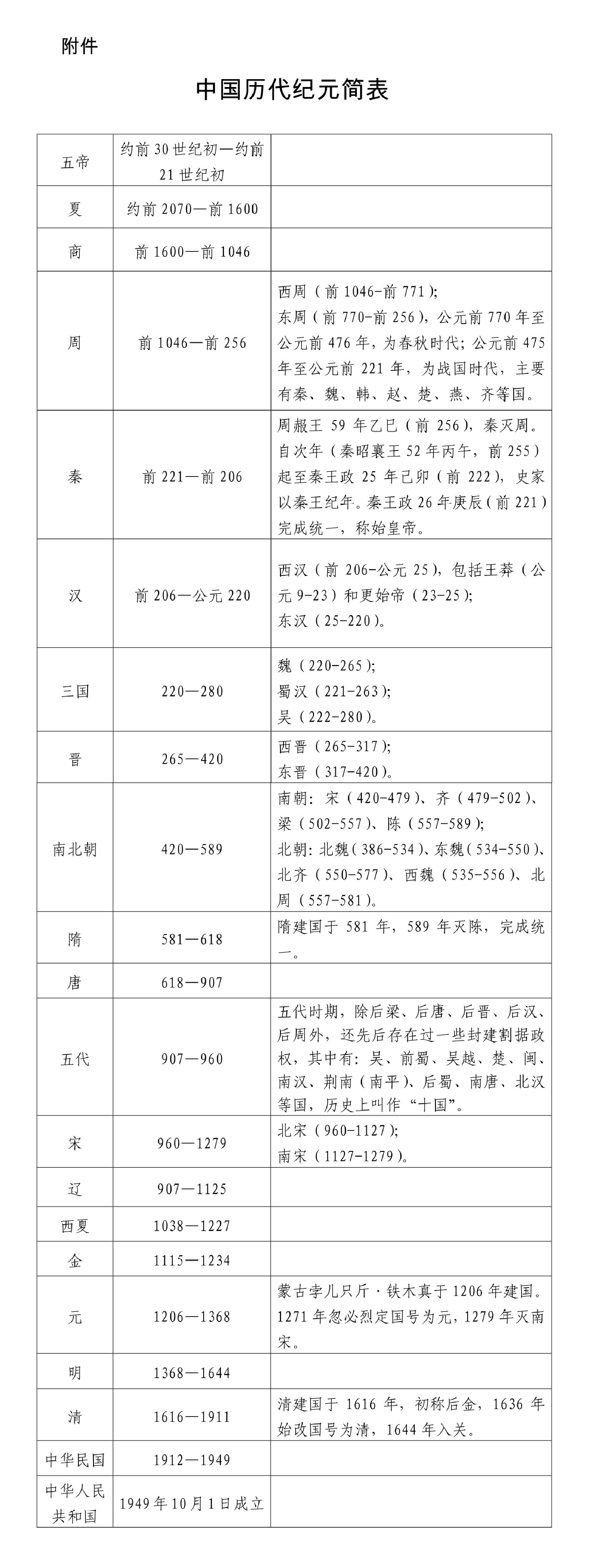









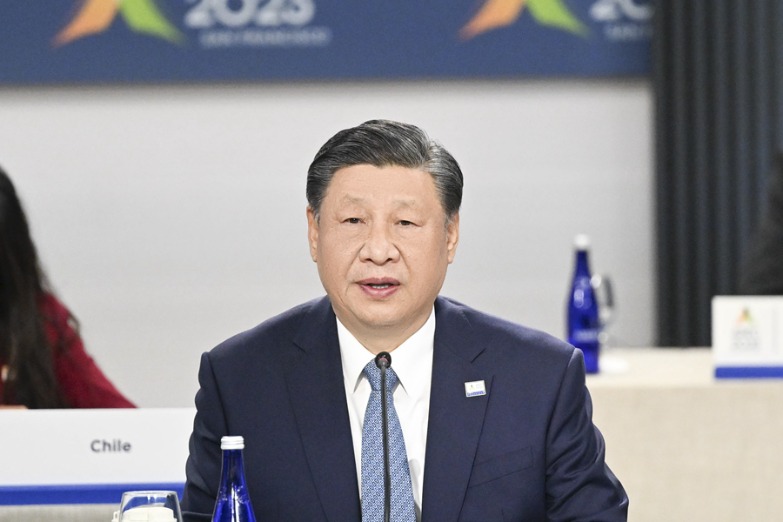

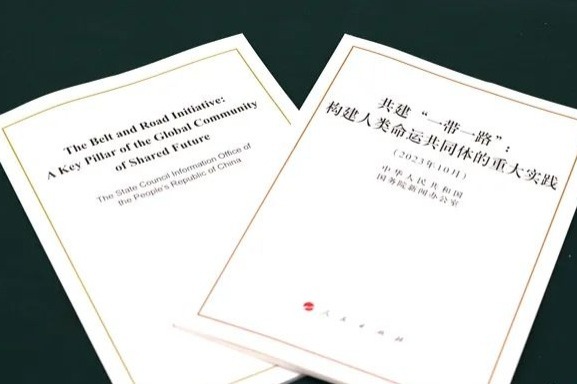
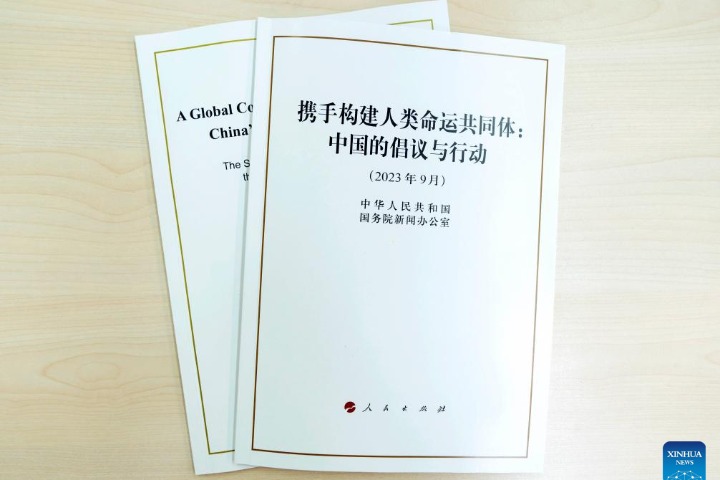
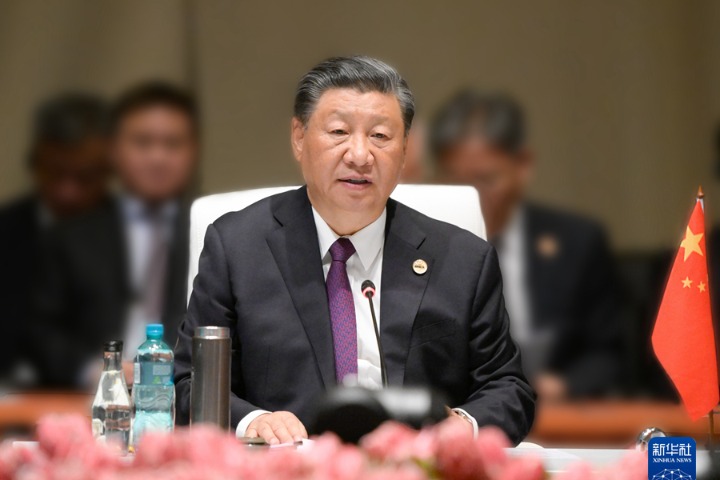



 英語點津微信
英語點津微信 雙語小程序
雙語小程序